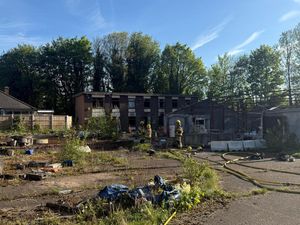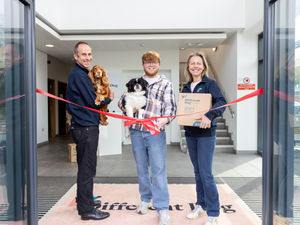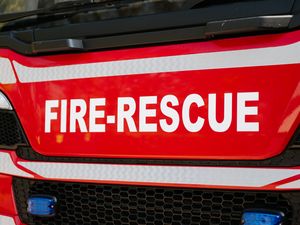Telford police officer honoured after saving pensioner's life
A police officer and PCSO who turned life-savers in the aftermath of a Six Nations Rugby match have been awarded top national life-saving honours.

PC Kirk Smith of Ketley, Telford, and PCSO Steven Redmond, of Cardiff, have each been awarded Royal Humane Society Resuscitation Certificates for their life and death battle at Cardiff Central Station on the evening of February 11.
Between them they succeeded in bringing a 76-year-old man, who had collapsed and stopped breathing at the station, back from the brink of death. The incident took place at a time when the station was crowded with supporters.
PC Smith was on duty when he heard a commotion and went to investigate.
He found the man had collapsed and on checking him found no vital signs of life. PCSO Redmond heard a call for assistance, collected a defibrillator from another platform and then rushed to help.
PC Smith had already started to administer cardiac pulmonary resuscitation (CPR) and continued with it while the PCSO set up the defibrillator. They administered four shocks over the course of seven minutes before paramedics arrived.
Thanks to their efforts the man began breathing again and later went on to recover in hospital.
"Swift action undoubtedly saved this elderly man’s life"
On top of the awards, the two officers have also won the personal praise of Andrew Chapman, secretary of the Royal Humane Society.
As he announced the awards at the Society’s London headquarters, he said: “Their swift action undoubtedly saved this elderly man’s life. They were working in difficult conditions with fans milling round everywhere.
“But thanks to their efforts the man resumed breathing. Time is of the essence in situations like this and thankfully they were on the spot to begin life-saving treatment immediately.”
“This is yet another incident that emphasises the value of as many people as possible – members of the public as well as members of the emergency services - getting trained to administer CPR. No-one wants to have to use it but it can, as in this case make the difference between life and death.”
No date has yet been fixed for presentation of the awards, which have been made following a recommendation from British Transport Police, but they are expected to take place in the near future.
The roots of the Royal Humane Society stretch back more than two centuries. The Queen is its patron and its president is Princess Alexandra. It is the premier national body for honouring bravery in the saving of human life.
It was founded in 1774 by two of the day’s eminent medical men, William Hawes and Thomas Cogan. Their primary motive was to promote techniques of resuscitation.
However, as it emerged that numerous people were prepared to put their own lives at risk to save others, the awards scheme evolved, and today a variety of awards are made depending on the bravery involved.
The Society also awards non health care professionals who perform a successful resuscitation. Since it was set up the Society has considered over 87,000 cases and made over 200,000 awards. The Society is a registered charity which receives no public funding and is dependent on voluntary donations.
It is one of a select number of organisations to recently receive a donation from the Patron’s fund which was set up to acknowledge work done by organisations of which the Queen is the patron to mark her 90th birthday.





